In Nambi Kelley’s “Xtigone,” the ancient Greek city-state of Thebes is replaced by Chicago’s south side – an urban killing field marked by gang rivalry and drive-by-shootings. The protagonist, Tigs, wages a one-woman crusade to expose the truth, challenging patriarchy and political corruption, even at the expense of her own well-being. Kelley’s urban myth recasts Sophocles’ classic morality play about pride into a blood-soaked examination of gun violence and inner-city PTSD. The characters still make lengthy soliloquies, but they speak in contemporary vernacular. There is a hip-hop soundtrack (composed by Tommy Shepherd aka Soulati), references to social media, and several musical numbers. The Greek chorus now chants about police brutality and HIV. It’s an amazing show.
The play was originally scheduled to debut in 2012, but was postponed until this year. The current African American Shakespeare Company production, thus, marks the official world premiere of “Xtigone” – a different production is scheduled for Chicago later this year—a play with a message, whose already-relevant subject matter has gained only more currency with the emergence of the #BlackLivesMatter movement.
A strong cast from top to bottom anchors the production, with the younger actors more than holding their own with veteran stage performers. As Tigs, Oakland’s Ryan Nicole Austin is a revelation. Her role is one requiring inner strength, conviction, and compassion, qualities she evokes seemingly effortlessly. It’s not easy to portray a woman who is emotionally vulnerable, and physically and mentally strong at the same time. Austin thankfully lets Kelley’s prose come to her, without overreaching. A gifted poet, rapper, and singer, she brings a feminist hip-hop swagger to the part, which is exactly what’s called for.
In one scene, Tigs is chastised for her activist ambitions by her sister Izzy (played by Tavia Percia) — a woman who has accepted subservience along with fake hair. Defiantly, Tigs announces, “we stand on the shoulders of Herstory. I am the amazons of Dahomey, the queen called Nefertiti, Coretta, Obama’s mama, and if I stand still, Mama Till.”
Another Oaklander, Naima Shalhoub, practically steals every scene she’s in as Tea Flake, a character who functions much like a griot, singing the praises of patriarchal leader Marcellus Da Man, as well as offering a running narrative commentary as events unfold. Shalhoub’s character often has something serious to sing about, but there are also comedic elements which make her somewhat of a jester in Marcellus’ court.
The third youthful standout is Michael Wayne Turner, who plays Tigs’ boyfriend, Beau. This guy can straight-up act, and his dynamic rendering of the character doesn’t lack for energy at all. Also good is AeJay Mitchell as Tigs’ murdered brother E-Mem, whose ghost hangs around watching –and sometimes commenting on—the proceedings after his unfortunate death in the play’s opening scene.
As Marcellus, Dwight Dean Mahabir has gravitas. His is a pivotal role, and he tiptoes the fine line between the arrogant bluster of political ambition and the more humanistic concerns of a father. His character isn’t completely sympathetic, but the audience is left with an understanding of why he’s made the choices he has. Yet another Oaklander, Jasmine Strange, plays his wife, Fay, who has devoted her life to his career, even at the expense of her own soul. Strange is also a gifted singer, and the scene where she and Shalhoub alternate verses resonates with vibrancy.
A crucial part is that of the “Old Blind Woman/Spirit,” played by Awele Makeba. As the Old Blind Woman, Makeba replaces Sophocles’ seer Tiresias, and functions as the conscience of the play. She sets in motion the cathartic transformation which first tests and then redeems Marcellus, ultimately causing him to rethink his actions. Yet Marcellus’ redemption can’t prevent further tragedy from happening.
As the Spirit, Makeba grounds the play in ritual, connecting the spiritual world to the physical one, using African dance moves in place of speech throughout most of her scenes. Towards the end, she does speak a few times, signifying a breach of the wall separating the two worlds, implying the transcendent process the characters have undergone.
The production is anything but static, with fluid choreography and several scenes where characters enter the stage from the audience. There is constant motion, reflecting a chaotic state of being. The Greek chorus—symbolizing the community—dances, raps, sings, and witnesses a failed attempt at a gang truce, followed by bodies piling up, as Marcellus strives to give the appearance of normality and order, by word of law.
The lighting and stage design are kept simple for the most part, yet the sparseness is surprisingly effective: in an early scene, Tea Leaf sings against a backdrop of projected pictures of child soldiers from different countries holding rifles. Simple props like a chair, a handgun, and basketball sneakers are amplified for maximum symbolic effect.
As a theater production, “Xtigone”—directed by veteran Rhodessa Jones—is very much in the tradition of the Black Arts Movement, from which Jones has drawn inspiration throughout her career. Not only does “Xtigone” recast Sophocles in a contemporary light, but it does so through an African American lens – addressing the issue of youth violence, but also of societal responsibility.
The play is also in the tradition of Yoruba ritual-myth – it evokes the blood/iron rituals of the orisha Ogun, whom playwright/author Wole Soyinka has called “the first actor” –and emphasizes spirituality over sensationalism, making its point through repetition of a few well-honed memes.
Tigs references Mamie Till—whose insistence on an open casket funeral for her murdered son Emmett catalyzed the Civil Rights Movement—on more than one occasion, and the couplet of “unearth the truth/thank the ancestors” voiced by E-Mem in the opening scene becomes a theme which underscores the entire play. By the end of the show, E-Mem himself has transitioned from gangbanger to “ancestral brother.”
“Xtigone” functions on two levels: on one hand, it revisits a classic Greek tragedy from a black feminist perspective. In that respect, it posits that a “change of heart” is possible for misguided male leaders like Marcellus – a stand-in for authoritarian politicians who have failed to address the roots causes of gun violence. But it also has a deeper purpose: to restore ritual into lives which have become devalued. It does this by offering glimpses into what Soyinka defined as the three stages of human existence—the world of the ancestors, the world of the living, and the world of the unborn—while setting its scenes in Soyinka’s fourth stage, the cthonic domain of Ogun.
This is a place where conflict and chaos recur without resolution, where love is overcome by hate, which only blood sacrifice can quell. That sacrifice is offered symbolically and metaphorically onstage, so that we, the audience, can be the change which needs to happen. By the end of the almost two-hour performance, it becomes clear that “Xtigone” has succeded in creating the ritual space. Now it’s up to us to do the rest.
“Xtigone” runs until March 8th at the AAACC’s Buriel Clay Theatre, 762 Fulton, SF. >> Buy Tickets.


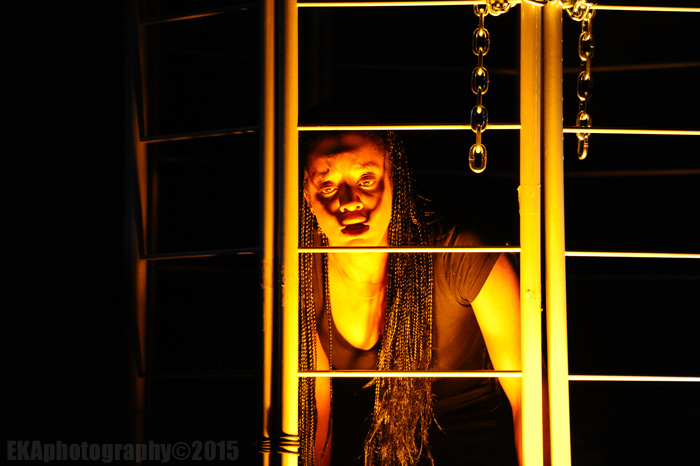

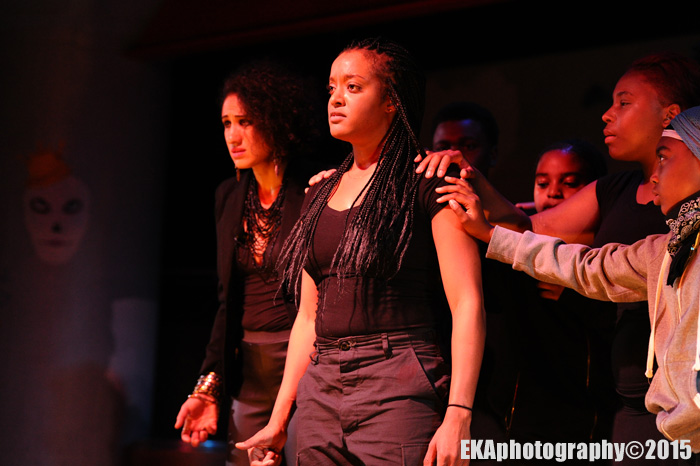
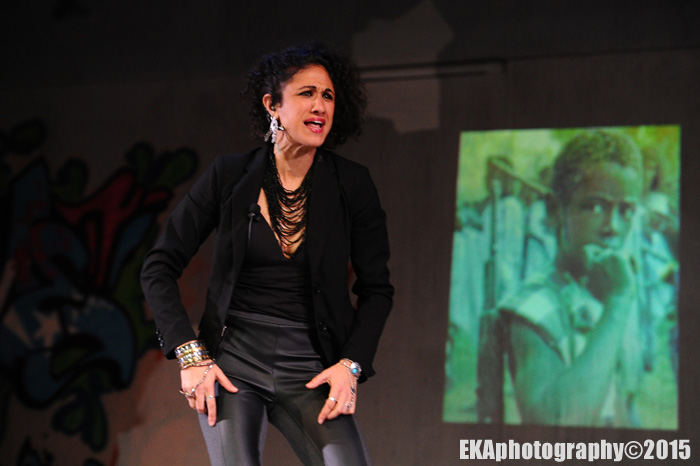
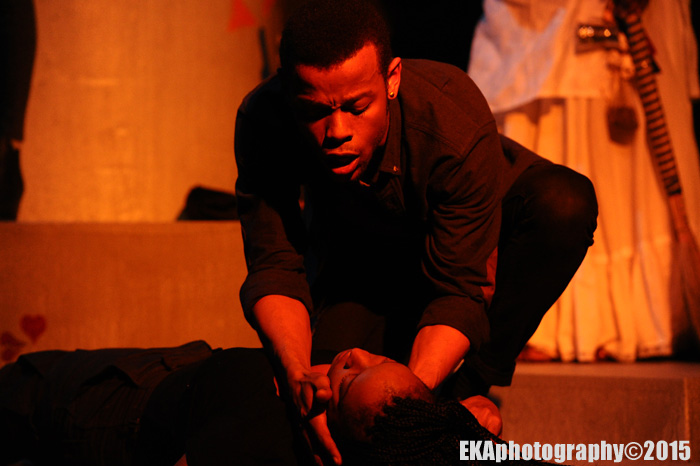
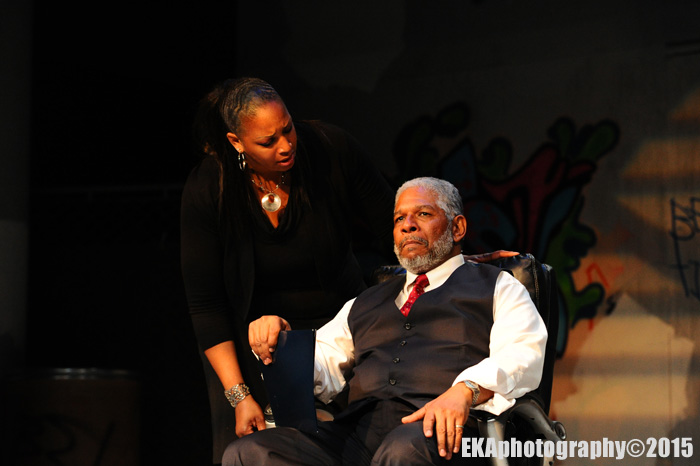
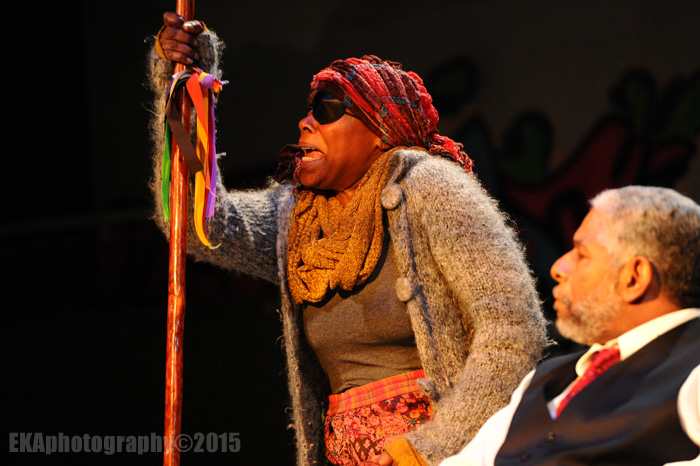
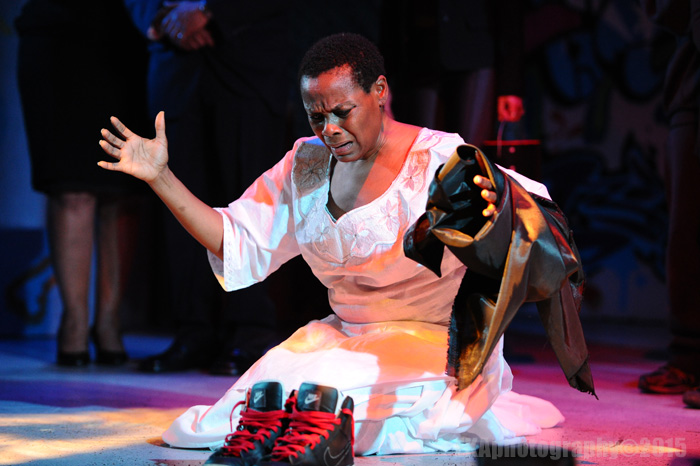
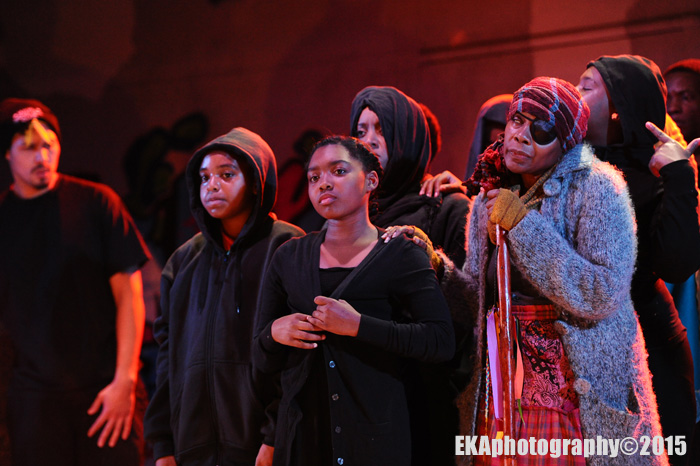
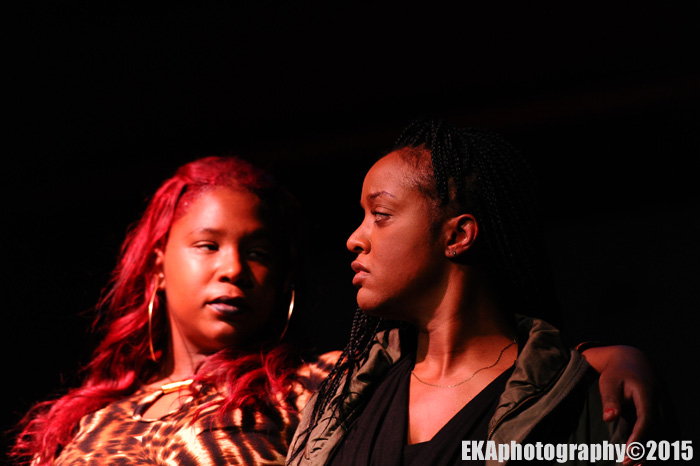
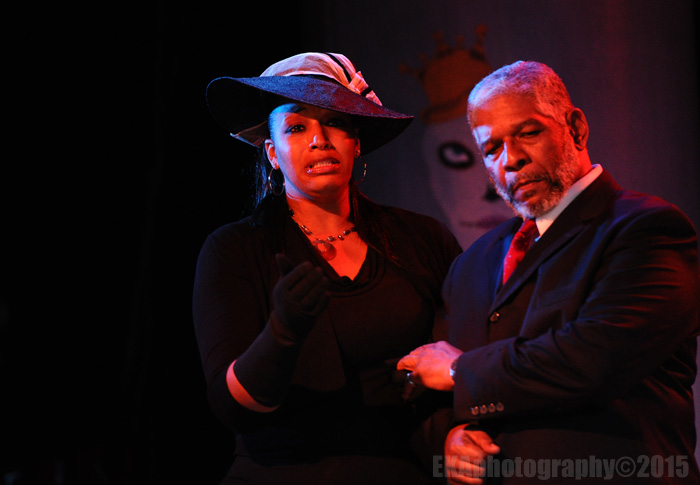
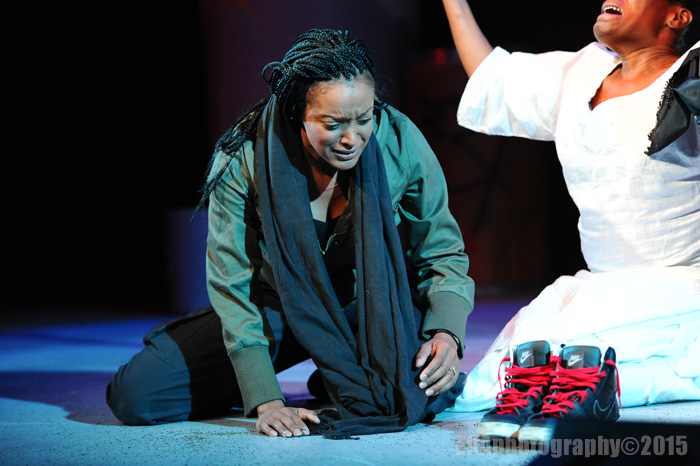
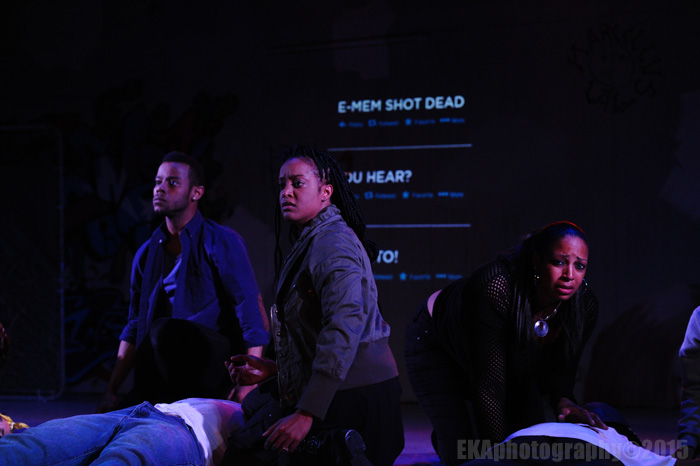
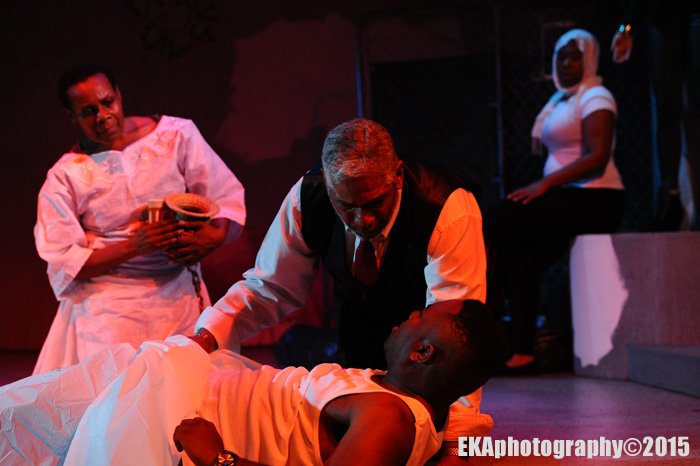
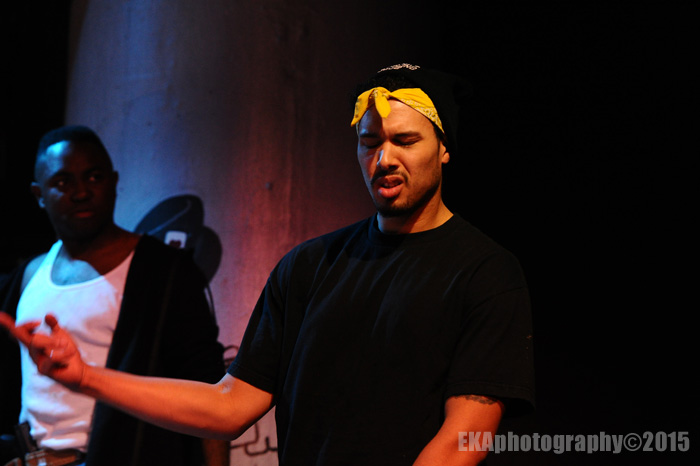
Pingback: Women Runnin It: Interview with Candi Martinez | Oakulture
Pingback: Women Runnin It: Interview with Naima Shalhoub | Oakulture